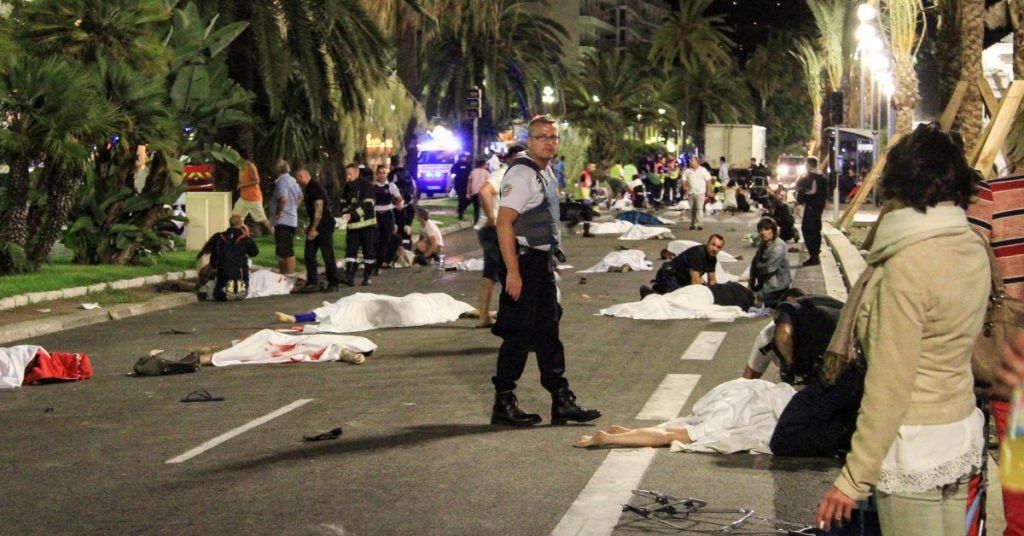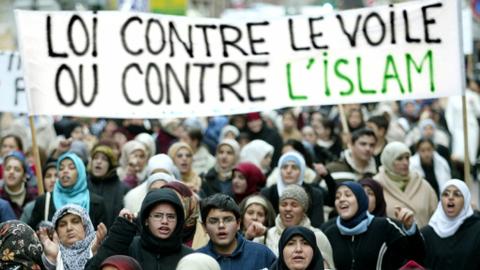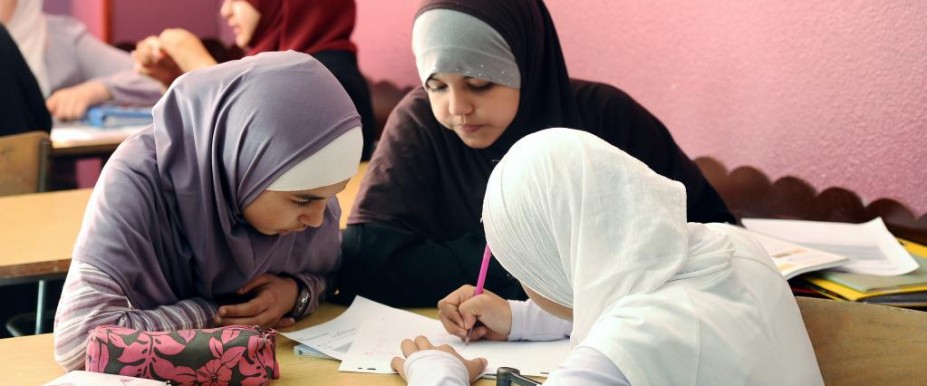Summary: Islamic nations across the world and prominent Muslim leaders have decried the new French law as Islamophobic. President Emmanuel Macron was accused of attacking Islam and for trying to re-inventing French “secularism”. The critics of the law accused that such a law would stigmatise the French Muslim community and snatch their ‘religious freedom’.
In contrast to such criticisms and fear mongering, the law which was passed by the Lower House aims at instilling Republic’s values by giving powers to the authorities to keep a tab on religious groups, intervene associations & groups, curb hate speech, dignity of human life, instill secularism, puts conditions of homeschooling and aims to protect police officers and their families from online trolling and harassment.
The law has been developed in consultation with Muslim leaders in France and has no specific reference to “Islamism” or Islam or any other religion. Most of its proposals have been approved by France’s fiercely independent, constitutional watchdog, the Conseil Constitutionnel. The law has been welcomed by both conservative and centrist parties of France.
On 28th November, More than 46,000 people gathered in Paris on Saturday to protest against France’s new security law which was yet to be approved by the French parliament. Islamic nations across the world and prominent Muslim leaders decried the law which was yet to be enacted as Islamophobic. The French Left, journalists, civil liberty groups, Human Rights activists, migrant activists and self-appointed custodians of Secularism in Europe, United States and elsewhere in the world lambasted President Emmanuel Macron for trying to bring in a law which impinges on the rights of Muslims in France.
Macron was accused of trying to appeal to right-wing voters by demonising Islam, especially before the Presidential election of early 2022. He was accused of attacking Islam and for trying to re-inventing French “secularism”. The critics of the law accused that such a law would stigmatise the French Muslim community and snatch their ‘religious freedom’.
Turkish President Recep Tayyip Erdogan called the legislation an “open provocation”, while scholars at Egypt’s prestigious Sunni Islamic institution, Al-Azhar, called Macron’s views “racist”.
Macron was targeted by international newspapers such as the Financial Times and New York Times with critical headlines even before the final law was passed by the lower house. Opinion pieces accused him of fostering a “hostile environment” for French Muslims.
After months of deliberations and postponements, the lower house of the French parliament approved the new law titled “Law for reinforcing republican principles” earlier this week. The legislation was originally titled as the “anti-separatism” bill but was changed after the criticism of the term.
Defending the bill at a press conference on 9th Dec, Prime Minister Jean Castex said the text does not target religious freedom but is aimed at “the nefarious ideology of radical Islamism”. He described the law as “a law of freedom, of protection and emancipation in the face of religious fundamentalism.”
Background to the New Law
The law was in the pipeline before the murder in October of Samuel Paty, a junior high school teacher who was attacked in the street and beheaded after showing cartoons of the Prophet Mohammed in a civics class.
But the killing, committed by an 18-year-old Chechen after a virulent social media campaign against the teacher, gave new impetus to the bill. It prompted the inclusion of the specific crimes of online hate speech and divulging personal information on the internet.
Paty’s death is one in a string of jihadist-inspired attacks in France which include the 2015 shooting sprees at satirical magazine Charlie Hebdo and the Bataclan concert hall attack, the stabbings at a church in the Mediterranean city of Nice the same year. Nice was also the scene of a 2016 attack that killed 86 people when a man rammed a truck into Bastille Day revellers.

The French governments have acknowledged that Islamist radicalisation is both homegrown as well as imported. The series of attacks led the government to investigate Islmaic associations and mosques that were suspected of spreading jihadist ideology and advocating separatism.
The attacks in Paris and Nice earlier this year had prompted Macron to observe that “Islam is a religion which is experiencing a crisis today, all over the world”, adding that there was a need to “free Islam in France from foreign influences”. His comments sparked a boycott of French products in several Muslim countries followed by violent protests during which the French flag and pictures of Macron were set on fire.
Unfazed by the calls for boycott and virulent criticism, Macron outlined the government’s plans to strengthen the country’s secularism and fight against separatism. He had informed the public that the government would end the system of allowing imams to train overseas, reduce homeschooling, and take control of religious funding. He had reiterated that the government’s focus would be on insisting on inculcating the respect for “the Republic’s values” in everyone.
The law will be presented to parliament in 2021 for ratification.
What’s there in the Law?
The law which is aimed at instilling Republic’s values by giving powers to the authorities to keep a tab on religious groups, intervene associations & groups, curb hate speech, dignity of human life, instill secularism, puts conditions of homeschooling and aims to protect police officers and their families from online trolling and harassment.
Among several articles, there are three articles of the law which have invited criticism from the HR activists and the Islamists. These laws concern enabling the police to organise ground and air mass surveillance and also restricts people from filming police officers on duty and sharing the same on social media and other platforms.
Articles 21 and 22 of the proposed law allows the police and the gendarmes (paramilitary forces) to use body cameras and drones to film citizens, and allow the recorded footage to be livestreamed to the command post.
Article 24 penalises publishing “the image of the face or any other element of identification” of a police or paramilitary official who is acting in “a police operation”, if the dissemination is done with “the intent of harming their physical or mental integrity”. Punishment for the crime will be imprisonment for up to 1 year, with a maximum fine of 45,000 euros.
Tab on Religious groups
Religious groups will have to declare any donations from abroad worth over €10,000. The law aims to lessen the foreign influence on places of worship.
Local authorities will be given the power to temporarily shut down any place of worship “in which the remarks that are made, the ideas or theories that are disseminated or the activities that take place: cause discrimination, hatred or violence” against a person or groups because of their race, ethnic group, religious beliefs, sexual orientation, or gender.

Intervention on associations
The law will give the authorities greater power to intervene against associations. Any such groups that apply for state subsidies will be asked to sign a contract respecting the Republic’s values. If they are found to be in breach of this contract, they will be forced to give back any funds received.
The new legislation will allow the government to attribute acts committed by its members to the association he/she is identified with. The government will have the power to temporarily halt the group’s activities.
Dignity of Human Life
The law allows the government to act against forced marriages and polygamy. Any person in France on a residency permit may have it revoked if they are found to be indulging in a polygamous relationships.
The new law also aims to crack down on any behaviour that violates the “dignity” of people, especially women. Under the new law, medical practitioners are now banned from delivering “virginity certificates”, which are often asked of women prior to a marriage.
The law also prevents men from disowning girls in favor of their religious beliefs.
Instilling Secularism
The law mandates that any person or entity, including contracted private companies representing the state or providing a state service, will be obliged to “ensure respect for the principles of secularism and neutrality of public service”.
Any attempt to intimidate a public service representative into granting an exemption or partial exemption of these rules based on religious beliefs is to be punished with five years in jail and a €75,000 fine.
Conditional Homeschooling
The government initially planned to make schooling mandatory for children above three years and ban all home-schooling, except for medical reasons. The concern was that lot of Muslim children were being sent to radical schools which inculcate separtism in them instead of French values.

However, the government has backed down slightly on homeschooling by allowing the practice to continue more or less in the same way but parents will now be expected to ask the authorities for approval. The approval will be given only for health reasons, practise of intensive sportive or artistic activity, the family’s nomad lifestyle, or any other special circumstances. The government has said that exceptions to allow homeschooling must be in accordance with the rights of the child.
Each homeschooled child will also be given a national identification number — which is already provided to every pupil in formal schooling — to allow authorities to ensure they are being provided with an education.
Online hate speech
Online hate speech will now be considered as a crime.Any act of disseminating information about someone’s private, family or professional life that makes them identifiable with the aim of endangering their lives will now be punishable by three years in jail and a fine of up to €45,000.
Punishment will be severe if the hate speech is targeted against a person holding public authority or entrusted with a public service mission.
Unjustified Criticism and Fear Mongering
The French government has informed that the law has been developed in consultation with Muslim leaders in France. The terms of the charter were drawn up in consultation with the main French Muslim umbrella group, representing nine Islamic organisations, the Conseil français du culte musulman.
Significantly, the law has no specific reference to “Islamism” or Islam or any other religion. Extreme ideas put forward by several leaders and ministers in the government (such as jail sentences for people who refuse to see a female doctor, who are mostly Muslims) have not been included. This is also the point on which the law was rejected in advance as too weak by the French right and Far Right.
Most of its proposals have been approved by France’s fiercely independent, constitutional watchdog, the Conseil Constitutionnel.
It is worth noting that the process of formulating such a law began much before the recent terror attacks in France. Hence, the government also insists that the law is NOT a response to the three Islamist terrorist attacks in October, including the beheading of the history teacher, Samuel Paty.
On charges of targeting press freedom, the French government has insisted that the new law is aimed at protecting police officers and their families from online trolling and harassment when off duty and does not intend to target press freedoms. Infact the government has been criticised by the law enforcement after Macron announced the creation of an online platform to flag police discrimination.
The law has received support from the country’s conservative parties along with Macron’s centrist La République en Marche (LaRem) party. Due to widespread support, the bill was easily passed on 8th Dec in the National Assembly, France’s lower house of parliament. In January 2021, the French Senate will vote on the bill.
